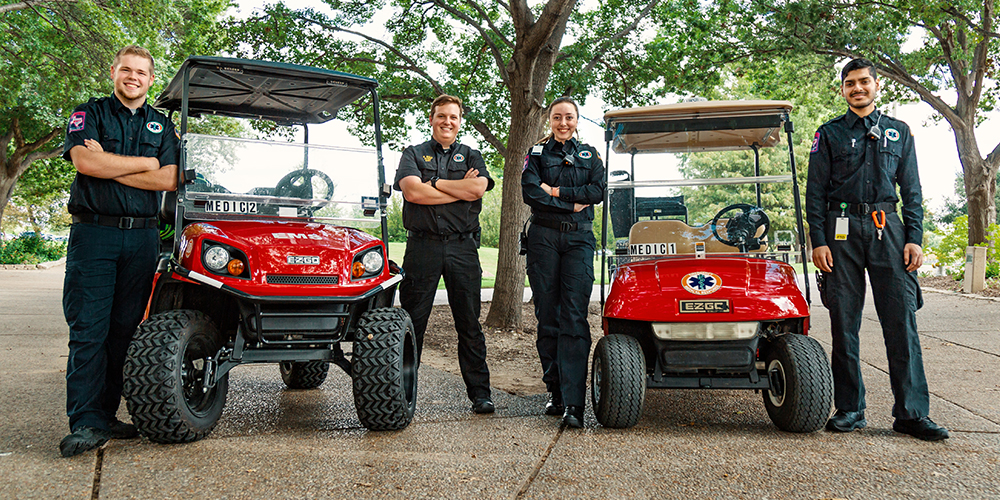Editors’ Note: This feature appears as it was published in the summer 2019 edition of UT Dallas Magazine. Titles or faculty members listed may have changed since that time.
 The University Emergency Medical Response team has two golf carts to respond to medical needs on campus. From left: psychology junior Landon Wright, neuroscience senior Scott Bell, biology sophomore Brooke Wilson and healthcare studies senior Jagan Kandadai are among the 28 team members.
The University Emergency Medical Response team has two golf carts to respond to medical needs on campus. From left: psychology junior Landon Wright, neuroscience senior Scott Bell, biology sophomore Brooke Wilson and healthcare studies senior Jagan Kandadai are among the 28 team members.
UT Dallas student volunteers with University Emergency Medical Response (UEMR) serve as around-the-clock first responders to provide fast, direct Basic Life Support and first aid on campus.
Since fall 2017, the UEMR team has grown to 28 student volunteers with emergency medical technician (EMT) training who provide 24/7 service.
The team responds to an average of two calls a day, said Scott Bell, chief of the UEMR team.
“We found that people were not getting care for minor injuries, such as cuts or scrapes from a skateboard fall,” said Bell, who is a neuroscience senior. “Now we’re handling those, and we’re also answering life-threatening calls: seizures, breathing emergencies, chest pains, stroke, psychiatric problems and trauma.”
UEMR volunteers, who are mostly pre-med students, use golf carts to arrive within two to four minutes at any location on campus. Housed in Cecil H. Green Hall, two rotating team members are on-call each night, with others filling daytime shifts.
The team provides CPR, respiratory assistance, basic medication assistance and other noninvasive, life-support measures. They recently were approved to administer lifesaving drugs, such as epinephrine and naloxone, as well as to complete blood glucose assessments.
The UEMR team is notified whenever someone on campus with a medical emergency calls the UT Dallas Police or the city of Richardson’s 911 system. The team responds quickly, while volunteers stay in touch with the city’s emergency dispatchers who continue to monitor the situation.
While the team consists mostly of students who have EMT or paramedic experience, faculty and staff with EMT training also can volunteer.
Bell, who hopes to eventually become a physician and work in emergency medicine, said being part of the team is “an adrenaline rush.”
“I love going in and not knowing what you’ll find,” Bell said. “Getting hands-on experience is never an easy thing to do. You’re responsible for someone’s life. But positively affecting patient outcomes is a real confidence builder for the providers, and the service is a great benefit to the campus community as well.”
The group received the 2018 First Responder Award at the Texas EMS Conference in Fort Worth. Sponsored by the Texas Department of State Health Services, the award is given to a registered first-responder organization that demonstrates emergency medical services leadership in patient care, public access, medical control, disaster preparedness, public education or training.
 The University Emergency Medical Response team has two golf carts to respond to medical needs on campus. From left: psychology junior Landon Wright, neuroscience senior Scott Bell, biology sophomore Brooke Wilson and healthcare studies senior Jagan Kandadai are among the 28 team members.
The University Emergency Medical Response team has two golf carts to respond to medical needs on campus. From left: psychology junior Landon Wright, neuroscience senior Scott Bell, biology sophomore Brooke Wilson and healthcare studies senior Jagan Kandadai are among the 28 team members.